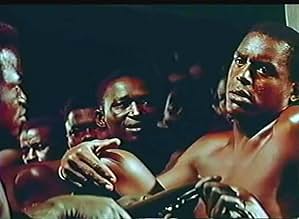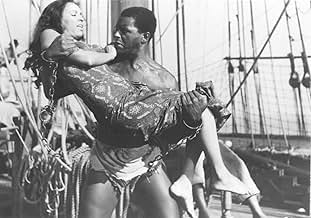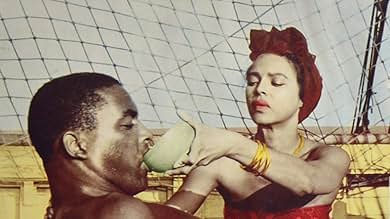Tamango
- 1958
- Tous publics
- 1h 44m
IMDb RATING
6.5/10
470
YOUR RATING
A Dutch slave captain, on a voyage to Cuba, faces a revolt fomented by a newly captured African slave, Tamango. The slaves capture the captain's mistress, forcing a showdown.A Dutch slave captain, on a voyage to Cuba, faces a revolt fomented by a newly captured African slave, Tamango. The slaves capture the captain's mistress, forcing a showdown.A Dutch slave captain, on a voyage to Cuba, faces a revolt fomented by a newly captured African slave, Tamango. The slaves capture the captain's mistress, forcing a showdown.
Featured reviews
The precedent user is right:it's based on a famous short story from Prosper Mérimée.It's strange that the writer's name does not appear in the credits on the IMDb page.Dorothy Dandrige had already been in "Carmen Jones " ,a Bizet opera based on another famous short story by...Prosper Mérimée.
"Tamango" was a failure when it was released and during the sixties,John Berry ,who had made a film noir chef d'oeuvre in the fifties ,"He ran all the way" was relegated to direct French pop star Johnny Hallyday in a forgotten turkey "A Tout Casser" .
"Tamango" is a well-made movie but it is icily impersonal.Aisha's character's evolution is predictable.On the other hand ,there's a good use of the wide screen (cinemascope ) particularly effective when it comes to depict the hold where the slaves cram.The documentary side is the most successful,and "Tamango" can be looked upon as the granddaddy of the "Roots " series in the seventies.Tamango himself is close to Kunta in that 1977 Marvin Chomsky's work.
"Tamango" was a failure when it was released and during the sixties,John Berry ,who had made a film noir chef d'oeuvre in the fifties ,"He ran all the way" was relegated to direct French pop star Johnny Hallyday in a forgotten turkey "A Tout Casser" .
"Tamango" is a well-made movie but it is icily impersonal.Aisha's character's evolution is predictable.On the other hand ,there's a good use of the wide screen (cinemascope ) particularly effective when it comes to depict the hold where the slaves cram.The documentary side is the most successful,and "Tamango" can be looked upon as the granddaddy of the "Roots " series in the seventies.Tamango himself is close to Kunta in that 1977 Marvin Chomsky's work.
A movie that, in 1958, at last began to approach the real horror of slavery, and gives us a suspenseful story besides. A group of Africans is taken aboard a Dutch slave ship in 1820, and their leader, Tamango (Alex Cressan) begins planning a rebellion, at first rather quietly, with what is practically civil disobedience - not eating the food. The film does a fantastic job at humanizing the Africans, and we see their reactions to be what any other captive group's would be, covering a wide range - despair, fear, submission, bravery, and intelligent scheming. We see the outright cruelty on the part of the slavers - throwing a man overboard to make an example to the group, hanging another, and leaving Tamango out in the sun as punishment - but to director John Berry's credit, it's not overdone, and we see the human side of these people as well, in their conversations and little moments. Far more insidious is the pervading view of racial superiority, so that underneath what is apparent civility is a monster, one that views others as property, and of no more value than that.
To those who cringe because Dorothy Dandridge is a "mistress" or is involved in an "interracial romance" because they believe it takes away from the central message of the film, I ask that you look again - she's a slave, owned by the captain of the ship, and forced to have sex with him. She makes what she really thinks of him very clear when he dupes her into thinking he's written out orders for her freedom. I think it does the film a disservice to see her involvement with the man as willing, and it does Dandridge one as well, since the actress fought for changes to the script to make this point clear. It's ironic that the miscegenation that got the film banned by conservatives in the United States upon its release in France, is today decried by liberals as a weakness, when neither group seem to fully recognize the main point of the film, and what Dandridge's (admittedly conflicted) role was.
With that said, there is something a little off about the film as a whole - probably the dialogue, which seems a little stilted at times (even allowing it the shortcut of not showing the usage of translators between languages, and has everyone speaking English). The acting itself is fine, and it's well cast. It's a shame that this was Alex Cressan's only performance, because he has such strong presence. Dandridge was at the height of her powers, and while that sadly had very little roles coming her way even after her fantastic performance four years earlier in 'Carmen Jones', she's a joy to behold here. Curd Jürgens is great as well as the captain, and the staging about the ship is reasonably realistic as well.
If you look at a list of films which portray slavery sorted by year, you'll see 'Tamango' is one of the earliest to show it honestly, and for that, it deserves respect. The film feels ahead of its time, and I admire blacklisted director John Berry's courage. He went to Europe and made a film that certainly didn't make him more loved in America because of its scenes with Dandridge and Jürgens kissing, and because of its realistic portrayal of slavery - something Hollywood and America were still having a hard time coming to terms with. Not perfect, but a very good film, and deserves to be better known.
To those who cringe because Dorothy Dandridge is a "mistress" or is involved in an "interracial romance" because they believe it takes away from the central message of the film, I ask that you look again - she's a slave, owned by the captain of the ship, and forced to have sex with him. She makes what she really thinks of him very clear when he dupes her into thinking he's written out orders for her freedom. I think it does the film a disservice to see her involvement with the man as willing, and it does Dandridge one as well, since the actress fought for changes to the script to make this point clear. It's ironic that the miscegenation that got the film banned by conservatives in the United States upon its release in France, is today decried by liberals as a weakness, when neither group seem to fully recognize the main point of the film, and what Dandridge's (admittedly conflicted) role was.
With that said, there is something a little off about the film as a whole - probably the dialogue, which seems a little stilted at times (even allowing it the shortcut of not showing the usage of translators between languages, and has everyone speaking English). The acting itself is fine, and it's well cast. It's a shame that this was Alex Cressan's only performance, because he has such strong presence. Dandridge was at the height of her powers, and while that sadly had very little roles coming her way even after her fantastic performance four years earlier in 'Carmen Jones', she's a joy to behold here. Curd Jürgens is great as well as the captain, and the staging about the ship is reasonably realistic as well.
If you look at a list of films which portray slavery sorted by year, you'll see 'Tamango' is one of the earliest to show it honestly, and for that, it deserves respect. The film feels ahead of its time, and I admire blacklisted director John Berry's courage. He went to Europe and made a film that certainly didn't make him more loved in America because of its scenes with Dandridge and Jürgens kissing, and because of its realistic portrayal of slavery - something Hollywood and America were still having a hard time coming to terms with. Not perfect, but a very good film, and deserves to be better known.
It's ironic to me that in the late 50s when the civil rights movement was getting
into high gear it was a French film that talked about slavery. Very few films
were made about the slave trade in studio era Hollywood. Offhand I can think of only two, Paramount's Souls At Sea and MGM's Stand Up And Fight.
Tamango was a French film and the title role is played by one Alex Cressan who made this and no other film. He is captured and sold to Dutch slavers and bound for Havana with others in a ship captained by Curt Jurgens.
Jurgens who does a lot of his thinking from south of the border has a bit of comfort in the bewitching Dorothy Dandridge. She's resigned herself to her life as a concubine, but has some concerns for her fellow Africans.
Herein is the problem with Tamango, A really good film about the brutality of the slave trade is spoiled by a personal story that seems almost soap operish. The cargo also carries woman slaves as well and no doubt the crew took and the captain could have availed himself there and I'm sure many did. It was the same criticism I made about All The Brothers Were Valiant where Robert Taylor has Ann Blyth aboard. You just didn't bring women on board back in those days. Too many problems with the crew's morale.
In any event the revolt of the cargo of slaves was well done and truly inspirational. Could be compared with Amistead which was about a true incident of a slave revolt.
A good film that falls just short of greatness is Tamango.
Tamango was a French film and the title role is played by one Alex Cressan who made this and no other film. He is captured and sold to Dutch slavers and bound for Havana with others in a ship captained by Curt Jurgens.
Jurgens who does a lot of his thinking from south of the border has a bit of comfort in the bewitching Dorothy Dandridge. She's resigned herself to her life as a concubine, but has some concerns for her fellow Africans.
Herein is the problem with Tamango, A really good film about the brutality of the slave trade is spoiled by a personal story that seems almost soap operish. The cargo also carries woman slaves as well and no doubt the crew took and the captain could have availed himself there and I'm sure many did. It was the same criticism I made about All The Brothers Were Valiant where Robert Taylor has Ann Blyth aboard. You just didn't bring women on board back in those days. Too many problems with the crew's morale.
In any event the revolt of the cargo of slaves was well done and truly inspirational. Could be compared with Amistead which was about a true incident of a slave revolt.
A good film that falls just short of greatness is Tamango.
"Tamango" is a rousing and intelligent tale of a slave ship revolt in the 18th century. It strives to avoid transparent moralizing and overt stereotypes, particularly by placing the gorgeous Dorothy Dandridge in the pivotal role of the Captain's mistress. She must decide whether to send him to his certain demise among her fellow Africans (as Leonard Maltin avers, it's way ahead of its time). Perhaps this even-handedness is not all that surprising given the fact that it was directed by the blacklisted John Berry, who found refuge in France after helming several sensitive films noirs about the urban American underclass.
Most references give the film's literary source as a novella by French author Prosper Merimée. However, I recently stumbled upon an article in the "New York Times" (August 24, 2005) concerning a South African archaeologist who is combing a beach off Cape Horn for the wreck of a Dutch slave ship named the Meermin. The history given of this particular ship is pretty much a blow-by-blow description of this film (apart from the miscegenation), even down to the very details of how the slaves were given their chance, and how the surviving crew foiled them at one point. I can't remember if the film acknowledges any true-to-life origins, but this shivery narrative certainly lends the movie even more credence.
Most references give the film's literary source as a novella by French author Prosper Merimée. However, I recently stumbled upon an article in the "New York Times" (August 24, 2005) concerning a South African archaeologist who is combing a beach off Cape Horn for the wreck of a Dutch slave ship named the Meermin. The history given of this particular ship is pretty much a blow-by-blow description of this film (apart from the miscegenation), even down to the very details of how the slaves were given their chance, and how the surviving crew foiled them at one point. I can't remember if the film acknowledges any true-to-life origins, but this shivery narrative certainly lends the movie even more credence.
"Tamango" is a film which surprised me, as I didn't expect to see such a strong film back in 1958. After all, in some parts of the USA, even in 1958, they would have hesitated to show a film where black men fight and kill their oppressors. It's a shame, as it's a dandy film.
The story begins in West Africa. A tribe is selling their conquered foes to a Dutch slaver (Curd Jurgens). However, among the slaves is a warrior...who also is a charismatic leader. He's determined NOT to make it to where ever the boat is headed and he insists on freeing himself from bondage. Eventually, he and his co-conspirators rise up against the crew and fight for their freedom.
The film is not perfect. I think it actually made the slave ship seem NICE compared to how hellish such boats often were. The same with the cruelty. While severe, I am sure many slave ships treated their 'cargo' much worse. But on the other hand, it's a strong indictment against this evil and is a great film about the human spirit. Well worth seeing...even if the ending is a bit weak.
The story begins in West Africa. A tribe is selling their conquered foes to a Dutch slaver (Curd Jurgens). However, among the slaves is a warrior...who also is a charismatic leader. He's determined NOT to make it to where ever the boat is headed and he insists on freeing himself from bondage. Eventually, he and his co-conspirators rise up against the crew and fight for their freedom.
The film is not perfect. I think it actually made the slave ship seem NICE compared to how hellish such boats often were. The same with the cruelty. While severe, I am sure many slave ships treated their 'cargo' much worse. But on the other hand, it's a strong indictment against this evil and is a great film about the human spirit. Well worth seeing...even if the ending is a bit weak.
Did you know
- TriviaAt initial release, depiction of interracial romance caused the film to be banned in the United States and in the French colonies.
- ConnectionsFeatured in Biography: Dorothy Dandridge: Little Girl Lost (1999)
- How long is Tamango?Powered by Alexa
Details
- Release date
- Countries of origin
- Language
- Also known as
- Die schwarze Sklavin
- Filming locations
- Production companies
- See more company credits at IMDbPro
- Runtime
- 1h 44m(104 min)
- Aspect ratio
- 2.35 : 1
Contribute to this page
Suggest an edit or add missing content



















